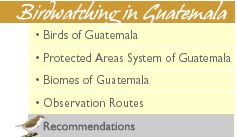| | | These recommendations are based on the American Birding Association (ABA) code, consulted in MacKinnon (2004) and complemented with information from Dallies (2008). In general, the ethical principle for bird watching says that “all those that enjoy birds and birdwatching must always respect wild life, the natural environment, and the rights of others… if any conflict of interest might arise between the birds and the birdwatchers, the well-being of the birds and the environment comes first”. The CONAP (2000) ecotourism regulation in protected areas maintain that “respect for life in all of its manifestations” must be a rule. Sometimes a great number of birdwatchers that use the same trail every day (regardless of how discreet they are) may cause some birds to hide or change the places where they live in; it is then important to follow some rules for both tourists and local guides. Some recommendations to follow the code of conduct: - Always speak quietly and never scream.
- Try not to move in any way that may disturb the birds.
- Wear neutral colors and don’t use strong perfumes; this will only alarm the birds and other fauna and cause them to hide.
- Do not constantly call out for birds and never during breeding season. If the birds are forced to constantly defend their territory, their will be unable to dedicate time to the necessities of their breeding season.
- Stay always on the marked trails.
- Respect the areas you are visiting; local authorities, owners and administrators of the destination have created minimum rules of conduct that facilitate the adequate managing of resources under their jurisdiction, and in many occasions these rules will guarantee your security.
- If you visit an area with aquatic bird colonies, it is prudent to watch them from a distance of around 320 to 490 feet, so you will not bother them. If you travel by boat it is better to turn off the engine before you encounter a flock of birds. If you see that the local guide or the person in charge of the boat does not follow these guidelines, make sure you tell them to do so.
- In general it is better not to invade a bird’s territory; in this way you will be able to observe their natural habitual behavior. An invasive and aggressive tourist can cause stress to birds, interrupting their feeding and resting periods, and even incurring permanent damage to a population.
| |
| | Don´t forget to always bring fresh water, insect repellent, light clothing, comfortable shoes, and a rain jacket or warm clothing, depending on the area you visit. Remember that in some places there are difficult trails, so walk slowly, and if you are not used to high altitudes, be sure to get accustomed to the altitude before you plan to climb any volcano. | |











